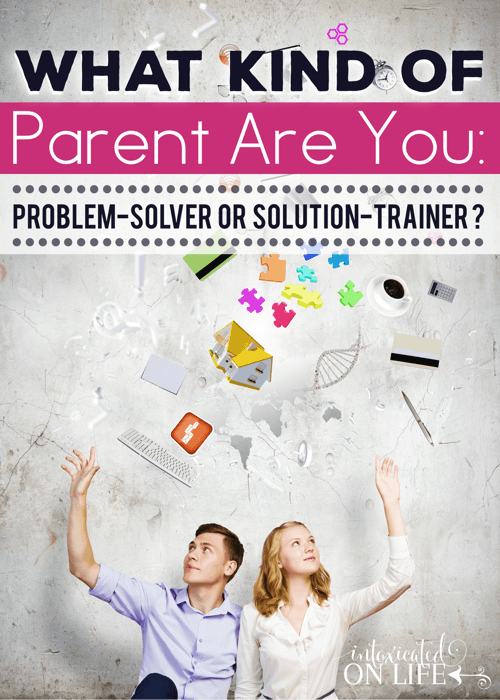“Mom, I’m tired of Julianne coming into my room and messing with my stuff. Tired of it!” my oldest daughter, Michaela, complained to me about her little sister recently.
How would you respond in this situation?
A.) “Julianne! Stop messing with things that don’t belong to you!”
B.) “Michaela, stop tattling. I don’t want to hear it.”
C.) “Oh, I know how frustrating that must be! What do you think you’re going to do about it?”
I tend to respond with option A or option B, depending on my mood (which is a pretty lousy rudder by which to steer this parenting ship).
And it turns out there’s a major drawback to those choices: they’re not teaching my daughter how to solve her problems.
Lack of Critical Thinking Skills
Did you know that colleges and employers are reporting that young adults don’t know how to employ basic critical thinking skills, like those required to solve problems? Unless, that is, you include the thinking required to dial Mom’s number so she can swoop in and save the day.
But when it comes to the skills required to come up with their own solutions, young people are woefully deficient—largely because their well-intentioned “helicopter parents” are always hovering close by, quick to answer the S.O.S. calls they’ve come to expect each day.
Done.
Problems with a professor?
Taken care of.
Issues with the boss?
Piece of cake.
Help with a paper?
Anytime!
Beginning well before the college years, this behavior starts with being too quick to intervene in the lives of our young children. Parents, terrified at the prospect of seeing our children unhappy, jump to alleviate any discomfort our kids are experiencing. We’re too eager for the quick fix.
While I’m in the same boat with all parents who like seeing their kids happy, it’s time we stop seeing our kids’ happiness as the ultimate goal. Happiness, after all, is a shallow and alarmingly deceptive gauge for our kids’ well-being.
Because there are more important things for my kids than what makes them happy.
Like what makes them healthy.
Critical thinking is among the most essential skills our kids need for healthy relationships and productive contributions to their families, their churches, their communities, and their places of business.
So where do we start in this pursuit of teaching our children how to think?
It just so happens that a little bit of logic goes a long way.
Developing Critical Thinking Skills
1.) Let kids make mistakes.
When you think of the life lessons you’ve learned, most of them are likely a direct result of mistakes you’ve made—not lectures you heard or warnings you heeded. That’s because God created humans with an astounding ability to look back on past results and evaluate whether a behavior is worth repeating.
Parents often fall for the lie that the best parents make sure kids avoid mistakes. But manageable mistakes are exactly what kids need to experience in order to learn lessons that will stick with them for a lifetime.
2.) Allow them to reap natural consequences.
As kids make mistakes, we should refrain from preventing the natural consequences of their actions whenever possible. Experiencing the repercussions that flow naturally from their behavior is a powerful teacher of cause and effect. Without learning this principle, kids are unable to see beyond the immediate gratification of their behavior, to the result that will follow.
For example, if your child forgets her equipment for sports practice, consider what natural consequences might help her learn to be more responsible. Perhaps she simply has to complete practice without it, earning discipline from her coach and disappointment from her teammates. Or maybe you’ll allow her to reimburse you for gas money to take her home and retrieve the equipment. She’ll be late for practice, which will still likely garner the coach’s rebuke, and she’ll be out a few bucks to pay for gas.
There are multiple ways you might approach this scenario, but the goal is the same: she will experience real-life consequences that stem from negligence. She’ll begin to grasp how her actions affect others. She’ll start to understand that time and money have value, and that when those commodities are invested in her life, she ought not take them for granted.
Will your child be happy in that moment when you don’t shield her from consequences? Probably not. But she’ll learn an important lesson in responsibility, which will make her a more confident and fulfilled person in the long run.
3.) Help them learn to solve problems.
I’m learning that wise parents won’t solve problems for their kids. They’ll listen sympathetically and then offer guidance in processing possible solutions and foreseeing potential outcomes.
In my opening example, if I ask my daughter how she’s going to handle her problem with her sister, it prompts her to think about possible solutions and their results. After hearing some of her thoughts, I might ask if she’d like some other ideas. I can offer some terrible solutions and some good ones—both of which will continue to help her consider what results might follow. But I will not make the decision for her.
When she makes a decision, she can own the outcome—building confidence if it’s successful, and growing in understanding if it’s a failure. That’s the ultimate win-win.
4.) Keep the spiritual central.
God created our minds with amazing capacities to think and reason. But He never intended for us to elevate brain power above the spiritual power of His Word and His Spirit.
In fact, God says, “The fear of the LORD is the beginning of wisdom, and knowledge of the Holy One is understanding” (Proverbs 9:10). God, after all, is the ultimate critical Thinker. He invented cause and effect. He created natural consequences. And the better we know our God, the deeper we’ll grow in understanding.











As a mom and a teacher I love this! I actually talk about what it means to be a problem solver with my kids. Such a important skill!!!
Stopping in from Dare to Share Saturday – I have a toddler and baby so have not had to employ this too much yet. To start with at least right now I try to let my toddler learn to play on her own and not jump in when she is in a dispute with another child unless someone is at risk of being hurt. I want her to learn to solve disputes with other kids on her own, especially the “it’s mine” issue and learning to share toys with other kids.
Thumbs up, Hil! Sounds like you’ve got a great start.
Nice article! I especially like this part:
if I ask my daughter how she’s going to handle her problem with her sister, it prompts her to think about possible solutions and their results. After hearing some of her thoughts, I might ask if she’d like some other ideas.
It’s important not to use, “What are you going to do about it?” to mean, “You’re on your own, kid–I don’t care!” but to mean, “Tell me your ideas, feelings, and priorities, and let’s talk about it.” It’s possible to offer guidance without taking over.
You might like this story about how my mom used brainstorming to solve a problem with me when I was 6. I recently reread it for inspiration: I’m going to be on my own with my 10-year-old and 1-year-old for a week while their dad goes camping, and he normally takes the baby out in the stroller to get her to sleep while I’m doing the big kid’s bedtime story–so I need my big kid to work with me to figure out how we can get everyone to bed on time and happy!
Yes, I agree with your comments, Becca. I don’t ever want to portray to my kids that I don’t care about their problems, but that I trust their ability to come up with viable solutions. Thanks for taking the time to comment!
Great reminder to teach our kids to think! Thank you for sharing this – and linking up to WFMW!
Thanks for having me! 🙂
This is great! I don’t have kids yet, but I’m hoping to sometime soon. In the meantime, I can practice using these ideas on my younger siblings. They could certainly use it! (I could’ve used it as a kid growing up, too, but my mom and dad handled things differently!)